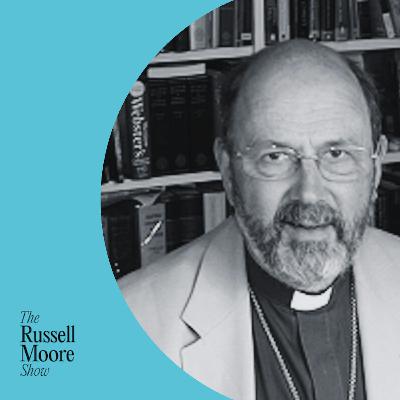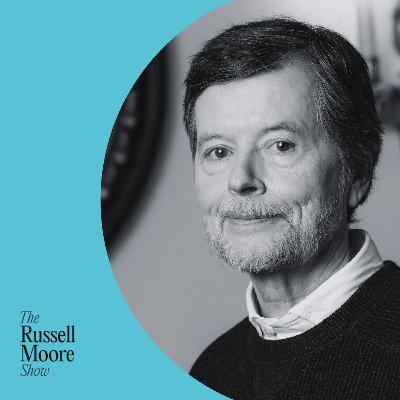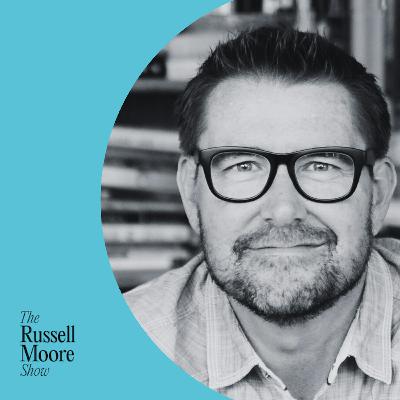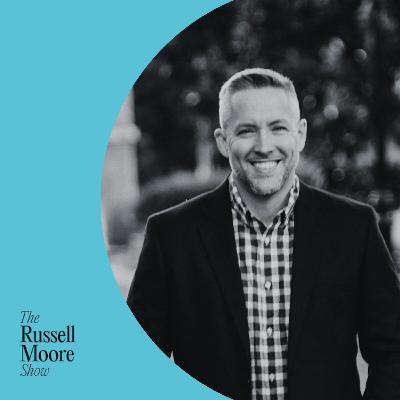Discover The Russell Moore Show
The Russell Moore Show

The Russell Moore Show
Author: Christianity Today, Russell Moore
Subscribed: 3,934Played: 89,614Subscribe
Share
© 2021 Christianity Today
Description
Listen in as Russell Moore, director of Christianity Today’s Public Theology Project and Editor-in-Chief, talks about the latest books, cultural conversations and pressing ethical questions that point us toward the kingdom of Christ.
417 Episodes
Reverse
Russell Moore talks with pastor and author David Platt (McLean Bible Church, Radical) about his new book All You Want for Christmas, which is built around one verse: “The Son of Man did not come to be served, but to serve.” Together they explore why this claim stands apart from every other religion’s story of humans climbing their way up to God—and why the Christian story begins with God coming down the mountain to us.
Platt and Moore talk about what it means to believe in a personal God in a culture that prays to “the universe,” how to face grief and doubt in the “happiest season of all,” and why the wonder of Christmas is both more comforting and more unsettling than we realize. They also discuss the difference between divine service and the prosperity gospel, the surprising role of dreams and magi in God’s self-revelation, and what it means to repent and trust when belief doesn’t come easily.
Platt shares stories from a Southeast Asian temple, a Muslim Uber driver’s midnight conversion, and his own family’s Christmas traditions—complete with “giving jars” and a goat that wasn’t for the kid who thought it was.
Resources mentioned in this episode:
All You Want for Christmas by David Platt
Radical by David Platt
Keep up with Russell:
Sign up for the weekly newsletter where Russell shares thoughtful takes on big questions, offers a Christian perspective on life, and recommends books and music he's enjoying.
Submit a question for the show at questions@russellmoore.com
Subscribe to the Christianity Today Magazine: Special offer for listeners of The Russell Moore Show: Click here for 25% off a subscription.
Learn more about your ad choices. Visit podcastchoices.com/adchoices
Russell and Leslie meander through the 2025 podcast episodes and share some of their favorite moments.
Watch the video of this episode on YouTube here.
See all podcast episodes for 2025 here.
Episodes referenced:
David Brooks on Moral Courage for a Soulless Age
Joni Eareckson Tada on When God Shows Up in the Breaking
Molly Worthen on Being Spellbinding
Michael Luo on Strangers in the Land
Paul Kingsnorth on the Dark Powers Behind AI
Christine Emba on the Fantasy of Porn’s Harmlessness
Jonathan Haidt’s Newest Thoughts on Technology, Anxiety, and the War for Our Attention
A Poet and a Preacher: A Conversation with David Whyte
Beth Moore on All Manner of Good Things
Beth Moore on Falling in Love with Ecclesiastes
Sho Baraka on Matters of the Soul Post-2020
Recovering Christian Vocabulary: A Conversation with Stanley Hauerwas
Tim Keller on Hope in Times in Fear (Re-air)
Keep up with Russell:
Sign up for the weekly newsletter where Russell shares thoughtful takes on big questions, offers a Christian perspective on life, and recommends books and music he's enjoying.
Submit a question for the show at questions@russellmoore.com
Subscribe to the Christianity Today Magazine: Special offer for listeners of The Russell Moore Show: Click here for 25% off a subscription.
Learn more about your ad choices. Visit podcastchoices.com/adchoices
Gather round ye listeners come…Andrew Peterson is back.
Watch the full conversation on YouTube.
Songwriter/author Andrew Peterson has been singing about the birth of Jesus every Christmas for over 26 years in the form of a Christmas concept album and tour called Behold the Lamb of God (LINK: catch the tour or livestream—available to watch until 1/31). In this special episode, Russell joins Andrew in the Chapter House–Andrew’s writing cabin–to talk about a tour that’s spent twenty-six years creating a Christmas tradition for thousands across the world.
Together, they swap stories about the origins of the album, the strange power of minor-key Advent songs, and the backstage chaos you never see—covert clementines, nightly TED talks, and the annual fear of forgetting a song that might contain more names than any other song ever written. They also talk honestly about exhaustion, longing, and why the story of the incarnation keeps surprising them after all these years.
Plus: Wingfeather cosplay, Randy Travis covering “Labor of Love,” British carol-singing that’ll blow your hair back, and why both of them have very strong opinions about the First Noel.
If you’ve ever wondered what makes this Christmas tour feel more like liturgy than concert—or why the gospel still sneaks up on people who think they’ve heard it all—this conversation is a warm, funny, deeply human place to land.
Resources mentioned in this episode:
Get 10% off the Behold the Lamb of God Livestream on December 12th from the Ryman Auditorium (watchable until January 31) with code RUSSELL10. Get tickets for the tour and livestream here.
Andrew Peterson’s The Wingfeather Saga
Randy Travis’ version of Labor of Love
Learn more about your ad choices. Visit podcastchoices.com/adchoices
Russell takes a listener question about whether some songs are better than others for worshipping in a congregational setting.
Watch the video of this episode on YouTube here.
Submit your own question for the show! Email questions@russellmoore.com — and remember: attach a voice memo!
Keep up with Russell:
Sign up for the weekly newsletter where Russell shares thoughtful takes on big questions, offers a Christian perspective on life, and recommends books and music he's enjoying.
Subscribe to the Christianity Today Magazine: Special offer for listeners of The Russell Moore Show: Click here for 25% off a subscription.
Learn more about your ad choices. Visit podcastchoices.com/adchoices
N.T. Wright joins Russell and Leslie to field a listener's question about the parable of the talents told in Luke 19, and why it’s not all that it seems.
Watch the video of this episode on YouTube here.
Submit your own question for the show! Email questions@russellmoore.com — and remember: attach a voice memo!
Keep up with Russell:
Sign up for the weekly newsletter where Russell shares thoughtful takes on big questions, offers a Christian perspective on life, and recommends books and music he's enjoying.
Subscribe to the Christianity Today Magazine: Special offer for listeners of The Russell Moore Show: Click here for 25% off a subscription.
Learn more about your ad choices. Visit podcastchoices.com/adchoices
In this episode, Professor N. T. Wright joins us to walk through Ephesians as a panoramic room with a view—sunrise to moonset—where heaven and earth meet, and spiritual warfare is real but not partisan. Drawing from his new book The Vision of Ephesians: The Task of the Church and the Glory of God, Wright argues that Paul’s language about “predestination” is vocational before it’s destinational: the church is chosen to live for the praise of God’s glory in the present.
RDM and Wright explore why Ephesians might have changed church history had the Reformers centered it as much as Romans and Galatians, how “principalities and powers” makes surprising sense in an algorithm-shaped age, and why unity and holiness aren’t rival goods but twin commands. They also wade into the passages that spark the most questions—marriage in Ephesians 5, mutual submission, and the armor of God—insisting on careful reading, cultural context, and a refusal to demonize flesh-and-blood neighbors.
Whether you’re Christian-curious or deep in the commentaries, Wright offers a way to read Ephesians both fast (to catch the sweep) and slow (to trace the seams), with the church embodying a many-colored wisdom that refuses tribal sorting.
Resources mentioned in this episode:
Keep up with Russell:
Sign up for the weekly newsletter where Russell shares thoughtful takes on big questions, offers a Christian perspective on life, and recommends books and music he's enjoying.
Submit a question for the show at questions@russellmoore.com
Subscribe to the Christianity Today Magazine: Special offer for listeners of The Russell Moore Show: Click here for 25% off a subscription
Learn more about your ad choices. Visit podcastchoices.com/adchoices
Russell takes a listener's question about how a non-believer can meaningfully engage in a book group with Christians.
Watch the video of this episode on YouTube here.
Submit your own question for the show! Email questions@russellmoore.com — and remember: attach a voice memo!
Learn more about your ad choices. Visit podcastchoices.com/adchoices
What happens when a 17-year-old's dive into the Chesapeake Bay changes everything—and the healing never comes?
Watch the full conversation on YouTube.
Fifty-seven years later, Joni Eareckson Tada sits across from me with an answer that might undo everything you think you know about strength, suffering, and the strange mercy of God.
In this conversation marking the 35th anniversary of the Americans with Disabilities Act, we go where few dare: into the raw, daily reality of quadriplegia, chronic pain that would break most of us by breakfast, and a two-time battle with breast cancer. But this isn't inspiration porn. This is Joni—unflinching, funny, and fiercely honest about what it means when "I can do all things through Christ" meets 4 a.m. despair.
We talk about the crushing loneliness of being the only wheelchair in a room full of chairs. The rage when well-meaning Christians promise healing that doesn't come. The particular exhaustion of advocating for your own existence. And why she tells God some mornings, "I have no strength for today. Can I borrow yours?"
But we also discover something unexpected: how limitation becomes liberation. Why the disabled community might be the most honest place in America. And what happens when churches stop trying to "fix" people and start making room for them.
Fair warning: Joni doesn't do platitudes. She'll tell you exactly what not to say to someone in chronic pain (spoiler: "everything happens for a reason" isn't it). She'll explain why she's terrified of a world that's editing out Down syndrome. And she'll make you rethink whether your church's "all are welcome" sign means anything if there's no ramp to the door.
This is for anyone who's ever wondered where God is when the miracle doesn't come. For those caring for someone who's suffering and don't know what to say. For all of us who suspect our obsession with optimization and control might be making us miss the point entirely.
Come for the practical wisdom. Stay for the kind of hope that only comes from someone who's been asking "How long, O Lord?" for nearly six decades—and still believes the answer matters.
Keep up with Joni’s work through Joni and Friends, here.
Keep up with Russell:
Sign up for the weekly newsletter where Russell shares thoughtful takes on big questions, offers a Christian perspective on life, and recommends books and music he's enjoying.
Submit a question for the show at questions@russellmoore.com
Subscribe to the Christianity Today Magazine: Special offer for listeners of The Russell Moore Show: Click here for 25% off a subscription.
Learn more about your ad choices. Visit podcastchoices.com/adchoices
Russell takes a listener's question about whether God can still use prayers, and the conversation broadens to mind-breaking theology about God’s transcendence of time itself.
Watch the video of this episode on YouTube here.
Submit your own question for the show! Email questions@russellmoore.com — and remember: attach a voice memo!
Keep up with Russell:
Sign up for the weekly newsletter where Russell shares thoughtful takes on big questions, offers a Christian perspective on life, and recommends books and music he's enjoying.
Subscribe to the Christianity Today Magazine: Special offer for listeners of The Russell Moore Show: Click here for 25% off a subscription.
Learn more about your ad choices. Visit podcastchoices.com/adchoices
Ken Burns says the American Revolution is "the most important event in world history since the birth of Christ." That's a bold claim—especially in a moment when the word "patriot" has become a weapon and the experiment that revolution launched feels more fragile than ever.
In this conversation, Russell Moore sits down with the legendary documentarian to explore what eight years of wrestling with the founders can teach us about our fractured present. How do you love a country—or a church—while being honest about its deep hypocrisies? Can you hold together progress and permanence, hope and clear-eyed realism? And what does faithfulness look like when certainty has replaced faith?
Burns's new series, The American Revolution (premiering November 16 on PBS), attempts something audacious: telling a visual story from an era with no photographs, bringing to life the contradiction-filled men who proclaimed "all men are created equal" while many of them held other human beings in bondage. Using voices including Tom Hanks, Liev Schreiber, and Claire Danes, Burns creates a narrative that refuses both myth-making and cynicism.
Burns discusses with RDM why labels such as “Heritage American” and “Christian America” fail and what the founders actually believed about divine providence (hint: it wasn't what you think).
Along the way: Schoolhouse Rock nostalgia, baseball metaphors, and what it means to be a patriot when the word itself has been hijacked.
Watch the full conversation on YouTube.Resources mentioned in this episode:
Watch Burns’ “The American Revolution” on PBS for free starting November 16th.
Keep up with Russell:
Sign up for the weekly newsletter where Russell shares thoughtful takes on big questions, offers a Christian perspective on life, and recommends books and music he's enjoying.
Submit a question for the show at questions@russellmoore.com
Subscribe to the Christianity Today Magazine: Special offer for listeners of The Russell Moore Show: Click here for 25% off a subscription
Learn more about your ad choices. Visit podcastchoices.com/adchoices
Russell takes a listener's question about whether the work of fallen songwriters and authors should be used for worship.
Watch the video of this episode on YouTube here.
Submit your own question for the show! Email questions@russellmoore.com — and remember: attach a voice memo!
Keep up with Russell:
Sign up for the weekly newsletter where Russell shares thoughtful takes on big questions, offers a Christian perspective on life, and recommends books and music he's enjoying.
Subscribe to the Christianity Today Magazine: Special offer for listeners of The Russell Moore Show: Click here for 25% off a subscription.
Learn more about your ad choices. Visit podcastchoices.com/adchoices
What if the biggest changes in your life aren’t sudden at all—but have been building quietly for years?
Watch the full conversation on YouTube
In this episode, Russell Moore sits down with pastor and author Mark Batterson (National Community Church, Washington, D.C.; The Circle Maker, Gradually, Then Suddenly) to talk about how transformation, calling, and even faith itself often arrive–as Hemingway once put it–gradually, then suddenly. From hard decisions and hidden preparation to the slow work of God that looks instant only in hindsight, they explore why patience may be the most underrated spiritual discipline of all.
Batterson and RDM talk about the writings of Eugene Peterson on the “long obedience” of a faith journey, the difference between patience and stagnation, how to know when you’re called to something and when you’re released from it, and why celebrity culture in the church short-circuits character formation. They get practical on habits (why 30 days feels like the hardest part), preaching long obedience in a city addicted to immediacy, learning grit without “snowplow” spirituality, and aiming at legacy that’s measured by who others become because of you.
If you’re looking for wisdom without hurry, conviction without hype, and hope that can take a punch and keep walking, this is the episode for you.
Resources mentioned in this episode:
Mark Batterson, Gradually, Then Suddenly
Ernest Hemingway, The Sun Also Rises
Eugene Peterson, A Long Obedience in the Same Direction
Keep up with Russell:
Sign up for the weekly newsletter where Russell shares thoughtful takes on big questions, offers a Christian perspective on life, and recommends books and music he's enjoying.
Submit a question for the show at questions@russellmoore.com
Subscribe to the Christianity Today Magazine: Special offer for listeners of The Russell Moore Show: Click here for 25% off a subscription.
Learn more about your ad choices. Visit podcastchoices.com/adchoices
Russell takes a listener's question about the Church body convicting each other in love without unnecessary division.
Watch the video of this episode on YouTube here.
Submit your own question for the show! Email questions@russellmoore.com — and remember: attach a voice memo!
Keep up with Russell:
Sign up for the weekly newsletter where Russell shares thoughtful takes on big questions, offers a Christian perspective on life, and recommends books and music he's enjoying.
Subscribe to the Christianity Today Magazine: Special offer for listeners of The Russell Moore Show: Click here for 25% off a subscription.
Learn more about your ad choices. Visit podcastchoices.com/adchoices
David French checks in on a potpourri of important subjects.
Watch the full conversation on YouTube
For longtime friends Russell Moore and David French, talking about what’s happening and where things are going is virtually an everyday occurrence. This time, though, they decided to let us listen in. RDM refused to write notes to plan out this conversation and said, “Let’s just go on the air–unfiltered.” This is that conversation.
French, New York Times columnist and author, and RDM discuss everything from whether revival is happening among Gen Z to why we’ve seen such a backlash against women in evangelical circles to whether the gender identity disputes are not over to whether we are headed toward a dark place on questions of religious freedom.
Then they get personal—talking about why, after all they’ve each seen, they are still Christians, and what advice they would give to those who wonder if they still can be.
If you’re looking for honesty without despair and candor without cynicism, this is the episode for you.
Resources mentioned in this episode:
Richard Hanania article, ”The Based Ritual”
David’s article about his incurable disease in the New York Times, ”I Believe in Miracles. Just Not All of Them.”
Sign up for David’s newsletter
Keep up with Russell:
Sign up for the weekly newsletter where Russell shares thoughtful takes on big questions, offers a Christian perspective on life, and recommends books and music he's enjoying.
Submit a question for the show at questions@russellmoore.com
Subscribe to the Christianity Today Magazine: Special offer for listeners of The Russell Moore Show: Click here for 25% off a subscription
Learn more about your ad choices. Visit podcastchoices.com/adchoices
Russell takes a listener's question about church membership and the Communion table.
Watch the video of this episode on YouTube here.
Submit your own question for the show! Email questions@russellmoore.com — and remember: attach a voice memo!
Keep up with Russell:
Sign up for the weekly newsletter where Russell shares thoughtful takes on big questions, offers a Christian perspective on life, and recommends books and music he's enjoying.
Subscribe to the Christianity Today Magazine: Special offer for listeners of The Russell Moore Show: Click here for 25% off a subscription.
Learn more about your ad choices. Visit podcastchoices.com/adchoices
What if the real radicals right now are the ones who refuse to join the outrage mobs?
Watch the full conversation on YouTube
Russell Moore talks with pastor and author J.D. Greear about his new book Everyday Revolutionary and the surprising power of grace in an age addicted to “courage” and “clarity.” Starting with the story of how J.D. befriended the man who tried to dox him, the two dig into why Christian conviction without compassion turns hollow—and how ordinary believers can live with the kind of quiet strength that actually changes things.
They explore what witness looks like when the internet never blinks, what evangelism means in a world both secular and spiritual, why pastors burn out, and what might replace the megachurch in twenty years.
Plus: Hear about the one and only time Russell Moore has ever passed out.
Resources mentioned in this episode:
Everyday Revolutionary by J.D. Greear
Molly Worthen’s episode on our show
Keep up with Russell:
Sign up for the weekly newsletter where Russell shares thoughtful takes on big questions, offers a Christian perspective on life, and recommends books and music he's enjoying.
Submit a question for the show at questions@russellmoore.com
Subscribe to the Christianity Today Magazine: Special offer for listeners of The Russell Moore Show: Click here for 25% off a subscription.
Learn more about your ad choices. Visit podcastchoices.com/adchoices
Russell answers a listener’s question about making time to be a better writer
Watch the video of this episode on YouTube here.
Submit your own question for the show! Email questions@russellmoore.com — and remember: attach a voice memo!
Keep up with Russell:
Sign up for the weekly newsletter where Russell shares thoughtful takes on big questions, offers a Christian perspective on life, and recommends books and music he's enjoying.
Subscribe to the Christianity Today Magazine: Special offer for listeners of The Russell Moore Show: Click here for 25% off a subscription.
Learn more about your ad choices. Visit podcastchoices.com/adchoices
If you’ve ever wondered what a conversation about Ecclesiastes between Tigger and Eeyore sounds like, it’s your lucky day.
Watch the full conversation on YouTube
In a recent episode, Sho Baraka became the first guest to choose the book of Ecclesiastes for his Desert Island, “5 Books of the Bible” challenge we sometimes end our show with. So it seems fitting that a few weeks later we welcome Beth Moore to talk about the relevance and timeliness of these passages that weep for the seeming futility of the human experience.
Together, Russell and Beth begin by exploring the relevance of the book for Christians and non-Christians alike. Then, they go on a free-wheeling exploration of the book including topics like surgeries and abandoned vineyards, Christmas Wig Exchanges, Stephen King, and, amazingly, Creed Bratton (if you know, you know).
If you’ve ever had the thought, "I hate life,” and assumed the Bible was ignorant to the human experience of suffering, listen to hear how God has not only acknowledged the turmoil of our existential strivings, but has actually given us words for it.
Resources mentioned in this episode:
Chasing Vines by Beth Moore
The Lost Art of Dying by Dr. Lydia Dugdale
Living Life Backward: How Ecclesiastes Teaches Us to Live in Light of the End by David Gibson
Keep up with Russell:
Sign up for the weekly newsletter where Russell shares thoughtful takes on big questions, offers a Christian perspective on life, and recommends books and music he's enjoying.
Submit a question for the show at questions@russellmoore.com
Subscribe to the Christianity Today Magazine: Special offer for listeners of The Russell Moore Show: Click here for 25% off a subscription
Learn more about your ad choices. Visit podcastchoices.com/adchoices
Russell takes a listener's question about what we should call religious participants in the MAGA movement.
Watch the video of this episode on YouTube here.
Submit your own question for the show! Email questions@russellmoore.com — and remember: attach a voice memo!
Keep up with Russell:
Sign up for the weekly newsletter where Russell shares thoughtful takes on big questions, offers a Christian perspective on life, and recommends books and music he's enjoying.
Subscribe to the Christianity Today Magazine: Special offer for listeners of The Russell Moore Show: Click here for 25% off a subscription.
Learn more about your ad choices. Visit podcastchoices.com/adchoices
Retired NFL player Benjamin Watson has been on this show several times over the years, and he’s recently released his own podcast, The Just Life. Russell was a guest on the show, and together they talked about Russell’s background along with matters of justice, gospel-centered living, and faithful action. Check out Ben’s show here.
Resources mentioned in this episode:
Against the Machine: On the Unmaking of Humanity by Paul Kingsnorth
Savage Gods by Paul Kingsnorth
Buccmaster Trilogy by Paul Kingsnorth
Paul’s Essay, “The Cross and the Machine”
Keep up with Russell:
Sign up for the weekly newsletter where Russell shares thoughtful takes on big questions, offers a Christian perspective on life, and recommends books and music he's enjoying.
Submit a question for the show at questions@russellmoore.com
Subscribe to the Christianity Today Magazine: Special offer for listeners of The Russell Moore Show: Click here for 25% off a subscription.
Learn more about your ad choices. Visit podcastchoices.com/adchoices















Fantastic interview! Thank you so much.
Very good interview. Thank you for this important topic. You did not do you 5 books for a desert island, though. Luo's book is in my loan due with my Library.